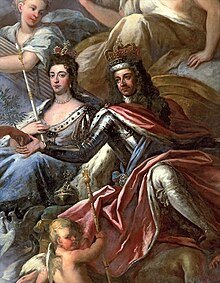1689: Coronation of King William III and Queen Mary II
On the 11th of April 1689, a momentous event took place in England. King William III and Queen Mary II were crowned as joint sovereigns of England, Scotland, and Ireland. This coronation marked the culmination of the Glorious Revolution, a pivotal moment in British history that saw the deposition of King James II and VII.
The Glorious Revolution of 1688 was a bloodless coup that resulted in the overthrow of King James II. It was a response to his autocratic rule and his attempts to establish Catholicism as the dominant religion in England. The revolution was led by a group of influential politicians and aristocrats who invited William of Orange, a Protestant prince from the Netherlands, to invade England and assume the throne.
William’s invasion was met with little resistance, and James II fled to France, paving the way for William and Mary to take the throne. However, their coronation was not a mere formality. It symbolized the establishment of a new era in British governance and the beginning of a constitutional monarchy.
The Bill of Rights 1689
One of the most significant outcomes of William and Mary’s reign was the passing of the Bill of Rights in 1689. This legislation, also known as the English Bill of Rights, was a landmark document that laid the foundations for a political system based on parliamentary sovereignty and the rule of law.
The Bill of Rights limited the powers of the crown and established important principles such as the right to petition the monarch, the prohibition of cruel and unusual punishment, and the right to a fair trial. It also affirmed the supremacy of Parliament and the right to free speech within its chambers.
This legislation was a direct response to the abuses of power by previous monarchs and aimed to prevent future monarchs from ruling without the consent of Parliament. It established a system of checks and balances that ensured the protection of individual liberties and significantly shaped the future of British democracy and governance.
Impact and Legacy
The coronation of William III and Mary II and the subsequent passing of the Bill of Rights had far-reaching consequences for British society and politics. It marked a shift towards a constitutional monarchy, where the power of the monarch was limited by law and subject to the will of Parliament.
This new political system laid the foundations for the development of modern democracy in Britain. It established the principle of parliamentary sovereignty, which remains a fundamental aspect of the British political system to this day. It also set a precedent for the rule of law and the protection of individual rights and freedoms.
The Glorious Revolution and the coronation of William and Mary also had wider implications beyond Britain. It inspired other countries to question the divine right of kings and to seek greater political and religious freedom. The events of 1689 served as a catalyst for future revolutions and the spread of democratic ideals.
For those interested in learning more about the coronation of William III and Mary II and the Glorious Revolution, there are several excellent external references available. The National Archives website provides detailed information about the Bill of Rights and its historical significance. The British Library also has a wealth of resources on this period of history, including primary sources and scholarly articles.
In conclusion, the coronation of King William III and Queen Mary II in 1689 was a pivotal moment in British history. It marked the end of an autocratic monarchy and the beginning of a constitutional monarchy based on parliamentary sovereignty and the rule of law. The passing of the Bill of Rights further solidified these principles and shaped the future of British democracy. The events of 1689 continue to be studied and celebrated as a significant milestone in the development of modern governance.

